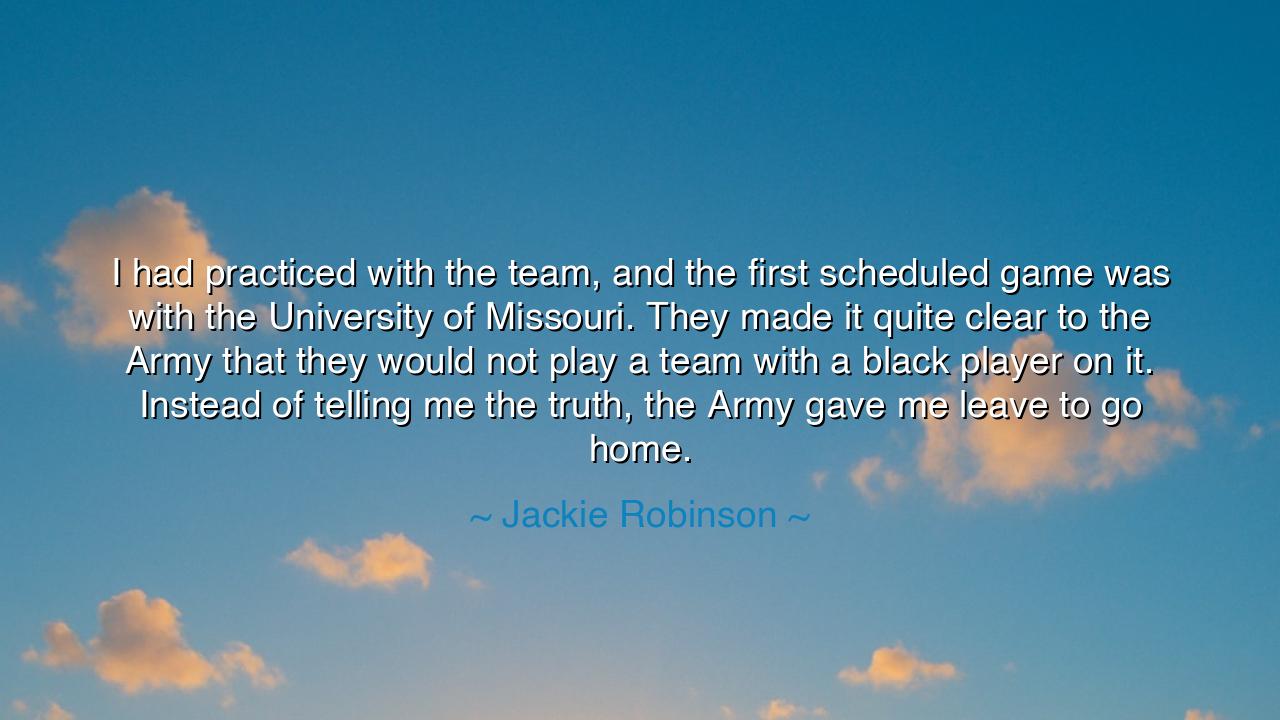
I had practiced with the team, and the first scheduled game was
I had practiced with the team, and the first scheduled game was with the University of Missouri. They made it quite clear to the Army that they would not play a team with a black player on it. Instead of telling me the truth, the Army gave me leave to go home.






In the solemn and courageous words of Jackie Robinson, we hear not only the story of a man, but the cry of a generation: “I had practiced with the team, and the first scheduled game was with the University of Missouri. They made it quite clear to the Army that they would not play a team with a black player on it. Instead of telling me the truth, the Army gave me leave to go home.” Behind these words lies a moment of quiet betrayal and immense dignity — a reflection of how truth was hidden to protect prejudice, and how one man’s grace amid injustice would later change the course of history. His experience was not simply his own; it was the mirror of a nation struggling to confront its own conscience.
This quote belongs to Jackie Robinson, the first African American to break the color barrier in Major League Baseball, but its origin traces further back, to his days as a young soldier during World War II. At the time, Robinson was stationed at Fort Riley and later at Camp Hood, serving in the U.S. Army while the country fought for freedom abroad — even as it denied it to many of its own citizens at home. He was a gifted athlete, chosen to play on the Army’s football team. But when the University of Missouri refused to face a team that included a black player, the Army — instead of standing in courage — chose silence. Rather than confront the sin of racism, they chose convenience. They sent him home, not with honor, but with avoidance.
In that small act of cowardice, a great injustice was revealed. For to deny a man his right to play, to compete, to stand beside his teammates as an equal, is to deny his humanity. And yet, even in that moment of exclusion, the seeds of Robinson’s greatness were sown. The Army’s silence was the world’s dishonor, but Robinson’s endurance was the beginning of something unbreakable. He had been forced to leave the field that day — but one day, he would return to a far greater one, where the entire nation would bear witness.
This moment must be understood in its full context. It was the 1940s, a time when segregation and racism were still woven into the fabric of American life. Even in the armed forces, where men fought side by side for liberty, equality was not yet a reality. The University of Missouri’s refusal to play reflected a nation’s sickness — a fear of equality masquerading as tradition. But what stands immortal in this story is not the cruelty of that act, but Robinson’s dignity in the face of it. He did not let bitterness consume him. He did not allow silence to silence him. Instead, he carried that memory like a torch — one that would light the path to change.
Years later, when he walked onto the baseball diamond as the first Black man in the Major Leagues, facing jeers, threats, and hatred from crowds and teammates alike, it was this same strength that guided him. He had already learned that institutions could lie rather than confront injustice, that people could pretend fairness while practicing exclusion. But he also knew that the measure of a person — the true test of character — is not how they are treated, but how they respond. Robinson’s restraint, his discipline, his refusal to fight hate with hate, was not weakness — it was the power of the soul refined through years of quiet suffering.
The story of this quote, then, is more than history — it is a parable. It teaches us that truth may be buried, but it cannot be destroyed, and that silence in the face of injustice is itself a betrayal of justice. The Army, by sending Robinson home, sought to avoid conflict; yet in doing so, they prolonged a far greater conflict — the moral struggle for equality. Their lie was not protection; it was complicity. Robinson’s response, however, was the antidote to that cowardice: integrity. In enduring humiliation without surrendering dignity, he embodied the courage that would later change hearts more powerfully than anger ever could.
The lesson here is clear and timeless: never accept comfort when truth is demanded, and never allow injustice to define you. For every person who faces exclusion, there lies the same choice that confronted Jackie Robinson — to let the world’s cruelty make you small, or to rise above it and make it witness your strength. Practically, this means standing firm when silence would be easier, telling truth when lies would protect your place, and carrying yourself with honor even when the world denies you fairness.
So remember, O listener, the enduring wisdom of Jackie Robinson’s story. When the Army sent him home, they thought they were removing a problem. What they did not know was that they were forging a hero. From that quiet dismissal grew a defiance that would one day shake the walls of segregation and awaken the conscience of a nation. Let his words remind you that truth denied is never truth destroyed, and that every act of injustice — when met with courage — becomes the seed of change. For those who walk with dignity through the fire of exclusion will one day become the flame that lights the way for generations to come.






AAdministratorAdministrator
Welcome, honored guests. Please leave a comment, we will respond soon